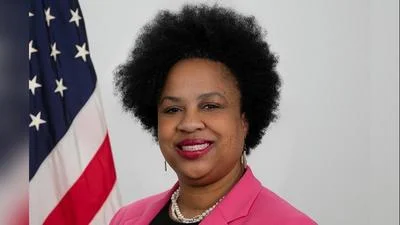The Congressional Record is a unique source of public documentation. It started in 1873, documenting nearly all the major and minor policies being discussed and debated.
“STATEMENTS ON INTRODUCED BILLS AND JOINT RESOLUTION” mentioning Richard J. Durbin was published in the Senate section on pages S177-S178 on Jan. 27.
Of the 100 senators in 117th Congress, 24 percent were women, and 76 percent were men, according to the Biographical Directory of the United States Congress.
Senators' salaries are historically higher than the median US income.
The publication is reproduced in full below:
STATEMENTS ON INTRODUCED BILLS AND JOINT RESOLUTION
By Mrs. FEINSTEIN (for herself, Mr. Padilla, Mr. Wyden, Mr.
Merkley, Mrs. Murray, Ms. Cantwell, Mr. Menendez, Mr. Booker,
Mr. Markey, and Mr. Sanders):
S. 58. A bill to amend the Outer Continental Shelf Lands Act to permanently prohibit the conduct of offshore drilling on the outer Continental Shelf off the coast of California, Oregon, and Washington; to the Committee on Energy and Natural Resources.
Mrs. FEINSTEIN. Mr. President, I rise today to reintroduce the ``West Coast Ocean Protection Act.''
This important legislation would prohibit oil or gas drilling in federal waters off the coast of California, Oregon, and Washington.
After four years of an Administration intent on allowing drilling off the West Coast and in waters across the United States, I am hopeful we will finally pass this bill to ensure no drilling ever occurs in Pacific waters.
I'm pleased to be joined today by Senators Padilla, Wyden, Merkley, Murray, Cantwell, Menendez, Booker, Markey, and Sanders in introducing this bill, which has been introduced in every Congress since the Deepwater Horizon disaster in April 2010.
11 people were killed and 17 others injured when the Deepwater Horizon well blew out. Oil and gas spewed into the Gulf of Mexico for 87 days.
Oil slicks covered the Gulf. Tar balls and toxic sludge covered beaches and wetlands. More than one-third of federal waters in the Gulf were closed to fishing.
While the Deepwater Horizon disaster reminded the world of the dangers of offshore drilling, Californians never had to be convinced; before Deepwater Horizon and Exxon Valdez, there was the tragic 1969 oil spill in Santa Barbara.
A well blowout on an offshore rig spilled more than 3 million gallons of crude oil according to some estimates--the worst spill in U.S. history at the time.
The spill closed local beaches--which were covered by a thick layer of oil--and thousands of marine mammals and birds were killed.
Tourists were turned away and commercial fishing operations were halted, hurting the local economy.
After the Santa Barbara spill, California had enough. The State blocked all new offshore drilling in state waters--which extend three miles from the shore--and in 1994 enacted a permanent offshore drilling ban.
Through local ordinances, congressional opposition, and presidential moratoria, all new drilling in federal waters off California has been blocked since 1984.
Today, opposition to offshore drilling is higher than ever. A 2018 poll found that nearly 70% of Californians oppose new drilling off our coast. The evidence is quite clear: Californians do not want any more drilling.
The California coast is an economic engine of growth for the state and the nation. A 2015 report produced by the National Oceanic and Atmospheric Administration found that California's 19 coastal counties created $662 billion in wages and $1.7 trillion in GDP in 2012.
Overall, California's ocean economy supports over 1 million jobs and generates significant growth for the U.S. Because of the unique nature of the West Coast ocean shelf, potential drilling would occur near the coastline and directly threaten the environment and robust economy.
It is long past time to respect the view of California and our fellow West Coast states by passing the ``West Coast Ocean Protection Act'' to permanently ban offshore drilling and protect the Pacific coast for generations to come.
I yield the floor.
______
By Mr. DURBIN (for himself, Mr. Sanders, Mr. Reed, Mr. Cardin,
Mr. Merkley, and Mr. Leahy):
S. 67. A bill to support efforts by international financial institutions to provide a robust global response to the COVID-19 pandemic; to the Committee on Foreign Relations.
Mr. DURBIN.
=========================== NOTE ===========================
On page S177, on January 27, 2021, in the third column, the following appears: By Mr. PAUL (for himself, Mr. Grassley, Mr. Portman, Mr. Scott of Florida, Mr. Rubio, Mr. Inhofe, Mr. Young, Mr. Moran, Mr. Rounds, Mr. Cramer, Mr. Blunt, Ms. Ernst, Mr. Sullivan, Mrs. Blackburn, Mr. Toomey, Mr. Sasse, Mr. Lee, Mr. Cassidy, Mr. Marshall, Mr. Braun, Mr. Cruz, Mr. Johnson, Mr. Crapo, Mrs. Hyde-Smith, and Mr. Risch): S. 68. A bill to amend chapter 8 of title 5, United States Code, to provide that major rules of the executive branch shall have no force or effect unless a joint resolution of approval is enacted into law; to the Committee on Homeland Security and Governmental Affairs.
The online Record has been corrected to read: By Mr. DURBIN (for himself, Mr. Sanders, Mr. Reed, Mr. Cardin, Mr. Merkley, and Mr. Leahy):S. 67. A bill to support efforts by international financial institutions to provide a robust global response to the COVID-19 pandemic; to the Committee on Foreign Relations. Mr. DURBIN.
========================= END NOTE =========================
Mr. DURBIN. Mr. President, I ask unanimous consent that the text of the bill be printed in the Record.
There being no objection, the text of the bill was ordered to be printed in the Record, as follows:
S. 67
Be it enacted by the Senate and House of Representatives of the United States of America in Congress assembled,
SECTION 1. SHORT TITLE.
This Act may be cited as the ``Support for Global Financial Institution Pandemic Response Act of 2021''.
SEC. 2. SUPPORT FOR A ROBUST GLOBAL RESPONSE TO THE COVID-19
PANDEMIC.
(a) United States Policies at the International Financial Institutions.--
(1) In general.--The Secretary of the Treasury shall instruct the United States Executive Director of each international financial institution (as defined in section 1701(c)(2) of the International Financial Institutions Act
(22 U.S.C. 262r(c)(2)) to use the voice and vote of the United States at that institution--
(A) to seek to ensure adequate fiscal space for world economies in response to the global coronavirus disease 2019
(commonly referred to as ``COVID-19'') pandemic through--
(i) the suspension of all debt service payments to the institution; and
(ii) the relaxation of fiscal targets for any government operating a program supported by the institution, or seeking financing from the institution, in response to the pandemic;
(B) to oppose any loan, grant, document, or strategy that would lead to a decrease in health care spending or in any other spending that would impede the ability of any country to prevent or contain the spread of, or treat persons who are or may be infected with, the SARS-CoV-2 virus; and
(C) to require approval of all Special Drawing Rights allocation transfers from wealthier member countries to countries that are emerging markets or developing countries, based on confirmation of implementable transparency mechanisms or protocols to ensure the allocations are used for the public good and in response the global pandemic.
(2) Report required.--The Chairman of the National Advisory Council on International Monetary and Financial Policies shall include in the annual report required by section 1701 of the International Financial Institutions Act (22 U.S.C. 262r) a description of progress made toward advancing the policies described in paragraph (1).
(b) IMF Issuance of Special Drawing Rights.--
(1) United states support for issuance.--The Secretary of the Treasury shall instruct the United States Executive Director of the International Monetary Fund to use the voice and vote of the United States to support the issuance of a special allocation of not less than 2,000,000,000,000 Special Drawing Rights so that governments are able to access additional resources to finance their responses to the global COVID-19 pandemic.
(2) Authorization to vote for allocation.--Notwithstanding section 6(a) of the Special Drawing Rights Act (22 U.S.C. 286q(a)), the United States Governor of the International Monetary Fund may vote to allocate up to 2,000,000,000,000 Special Drawing Rights under article XVIII of the Articles of Agreement of the International Monetary Fund.
(c) Termination.--Subsections (a) and (b) shall have no force or effect after the earlier of--
(1) the date that is one year after the date of the enactment of this Act; or
(2) the date that is 30 days after the date on which the Secretary of the Treasury, in consultation with the Secretary of Health and Human Services and the heads of other relevant Federal agencies, submits to the Committee on Foreign Relations of the Senate and the Committee on Financial Services of the House of Representatives a report stating that the SARS-CoV-2 virus is no longer a serious threat to public health in any part of the world.
____________________




 Alerts Sign-up
Alerts Sign-up